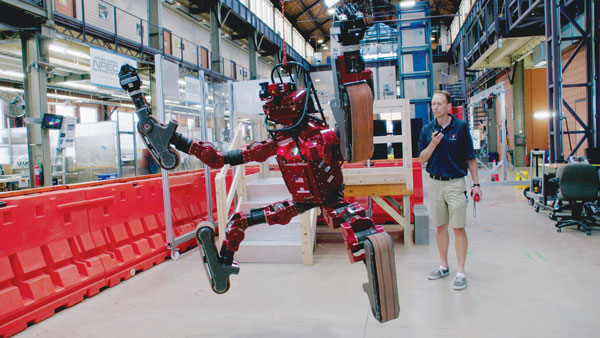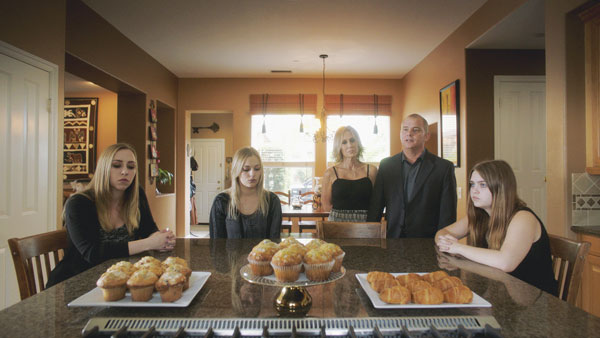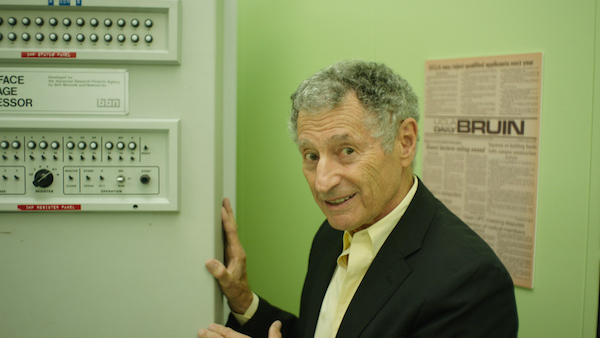
BY SEAN EGAN | Two teams of small cylindrical robots zip around a tiny soccer field in a lab, swerving to and fro, dribbling, passing, and shooting a ball into goals. An engineer brags that by the year 2050, these robots will have evolved to such an advanced state that they could defeat the FIFA world champions. After singing its praises, he affectionately picks up one of these automated, artificially intelligent Roombas — Robot Eight — and begins to describe its unique pattern of dot stickers.
“Beautiful. Do you love it?” interjects Werner Herzog from behind the camera, vocally smirking.
“Yes, we do. We do love Robot Eight.”
This is “Lo and Behold, Reveries of the Connected World” in miniature — a fascinating look at technology, that’s equal parts worrisome and humorous. It’s the latest documentary from Herzog, known as much for his pessimistic point-of-view and formalism as for his eccentric personality and distinctive accent. Fortunately for fans, all aspects of the iconoclastic German filmmaker are on display, as he decides to aim his probing camera toward the Internet’s past, present, and future. Now 73, Herzog famously didn’t discover cinema until he was 11, and made his first phone call at 17. He’s been similarly behind the curve when it comes to the Internet, reportedly only using email on rare occasions. Naturally, he researches the topic with an outsider’s eye, allowing him to dig into issues the average person would never think to broach.
Things start out standard enough, with Herzog chronicling the Internet’s birth and salad days as a small interconnected community, with its potential for good shown in the form of a gameified online scientific research tool. Unsurprisingly, though, the bad eventually creeps in. There’s a trip to a rehab center for online gaming addicts, a look at hacker culture, and, most heart-wrenchingly, a segment with a family plagued by horrific online harassers in the wake of a personal tragedy. The clan in the latter segment observes that there’s “no dignity or respect on the Internet,” and suggest that it may be a “manifestation of the antichrist.
From there, the examination quickly spirals into something strange and personal, as the filmmaker explores the offbeat subjects that catch his fancy (like a diversion to discuss Mars settlements with Elon Musk, or a trip to a colony of people “allergic” to electromagnetic fields). And this being Herzog, you can’t shake the feeling that he believes humanity just might be seriously (and hilariously) doomed, as a number of cataclysmic technological hypotheticals dominate large stretches of the film — such as a discussion of potential solar flares knocking out all systems and throwing the world into Y2K-esque rack and ruin, or talk of intense cyberwars between nation-states.

Thankfully, Herzog knows better than to render this push and pull between technology and man an unbearably bleak slog. The director, narrating as per usual, is as verbose and droll as ever, dispensing his trademark detached and lofty observations and inquisitions throughout (“Does the Internet dream of itself?” he wonders). Distinct directorial flourishes crop up — the very prominent and painterly framing of an empty chair and, more inexplicably, a veritable mountain of muffins in the harassment sequence, for instance — and keep the filmmaker’s hand in the proceedings even when he steps back. He’s also got a knack for choosing engaging and entertaining interview subjects — starting from the prelude, as Dr. Leonard Kleinrock flamboyantly shows off the Internet’s birthplace in UCLA — as well as knowing the right questions to ask to disarm them.
The net effect is a bit like helping an elderly relative set up their Wi-Fi, only to see them quickly become a deep web-spelunking conspiracy theorist. But even after taking Herzog’s deadpan paranoia with a hefty grain of salt, his core thesis still resonates: The human element is what is wrong with technology; the glitch, if you will. It’s through our complacency that technology has been allowed to rise, and be twisted for evil and destructive means. After all, we can’t blame nature for the ugliness of the Internet — we created it, and continue to welcome it into our homes and lives, pushing forward to an uncertain (and potentially dangerous) future.

Nonetheless, Herzog ends on a note of tenuous hope. As a group of bluegrass musicians play their hearts out, far from the maw of technology, he suggests things may, in fact, turn out fine. Does the human spirit — or perhaps art — have the ability to triumph over the tools we’ve created? At one point, a scientist informs the director that in the future, there will be AI-imbued robots capable of creating their own films. He hypothetically wonders if they will be better than Herzog’s.
“Of course not,” Herzog rejoins flatly, cutting the expert off. Despite all the ominous evidence to the contrary in “Lo and Behold,” it’s hard to disagree with him.
Runtime: 98 minutes. Written & directed by Werner Herzog. Opens Fri., Aug. 19 at IFC Center (323 Sixth Ave., at W. Third St.). Call 212-924-7771 or visit ifccenter.com. Also visit loandbeholdfilm.com and facebook.com/loandbeholdfilm.






























